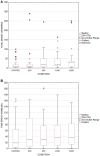Impact of Wagering Inducements on the Gambling Behaviors, Cognitions, and Emotions of Online Gamblers: A Randomized Controlled Study
- PMID: 33312142
- PMCID: PMC7704449
- DOI: 10.3389/fpsyt.2020.593789
Impact of Wagering Inducements on the Gambling Behaviors, Cognitions, and Emotions of Online Gamblers: A Randomized Controlled Study
Abstract
Wagering inducements are part of loyalty/reward programs implemented by online gambling operators to retain or attract consumers. They constitute incentives to bet that are offered to gamblers provided that they perform certain betting-related activities. They are often considered risk factors for gambling problems, but studies exploring the actual impacts of such incentives are scarce. The objective of the present study was to assess the actual impact of wagering inducements on gambling behaviors, cognitions, and emotions of online gamblers. One hundred seventy-one adults (18-65 years old) who gamble on a regular basis on the Internet, including at-risk and recreational gamblers, were recruited through media announcements and in panels from survey institutes. Participants were randomly assigned to one of four experimental conditions, in which a defined amount of money was given to the gambler with a bank e-card system during an experimental gambling session to simulate a wagering inducement (€10, €50, €100, or €200), or the control condition, in which no incentive was given. The experimental gambling session was designed to be as natural as possible (participants gambled with their own gambling account and their own money). Participants completed a pretest interview, took part in the experimental gambling session, and then completed a post-test interview. The impact of wagering inducements was estimated on objective (money wagered and time spent gambling during the gambling session) and subjective (cognitive distortions, enjoyment of gambling, loss of control, and respect of usual gambling habits) gambling endpoints that were compared between conditions. Two-thirds of participants reported having already received wagering inducements at some point of their gambling course. Although no effect was demonstrated on time spent gambling, inducements increased money wagered, gambling-related expectancies and perceived loss of control. In particular, it seems that wagering inducements could lead to extreme expenses, especially for at-risk gamblers. This research suggests that regulating wagering inducements could be helpful for prevention and early intervention. Future research on the impacts of wagering inducements is still needed, especially more ecological studies based on behavioral tracking data and studies assessing the differential impacts of various incentive types. Clinical Trial Registration: NCT01789580 (ClinicalTrials.gov).
Keywords: addiction; gambling disorder; gambling expectancies; loss of control; online gambling; prevention; responsible gambling; wagering inducement.
Copyright © 2020 Challet-Bouju, Grall-Bronnec, Saillard, Leboucher, Donnio, Péré and Caillon.
Figures
References
-
- McCormack A, Griffiths MD. A scoping study of the structural and situational characteristics of Internet gambling. Int J Cyber Behav Psychol Learn. (2013) 3:29–49. 10.4018/ijcbpl.2013010104 - DOI
Associated data
LinkOut - more resources
Full Text Sources
Medical


